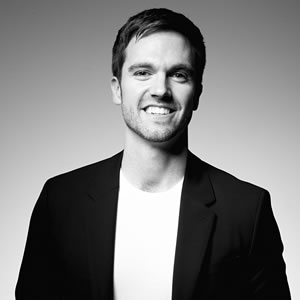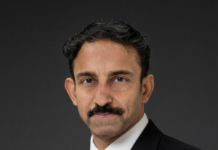Matt Maher Podcast Transcript
Matt Maher joins host Brian Thomas on The Digital Executive Podcast.
Brian Thomas: Welcome to Coruzant Technologies, home of The Digital Executive podcast.
Do you work in emerging tech, working on something innovative? Maybe an entrepreneur? Apply to be a guest at www.coruzant.com/brand.
Welcome to The Digital Executive. Today’s guest is Matt Maher. Matt Maher is a futurist, speaker and founder of M7 Innovations and Independent research and development firm.
He has guided executive teams at Fortune 100 companies through the ever-changing media and technological landscapes, conceptualizing, presenting, and executing on innovative solutions. Matt sits on the International Advisory Boards of Chanel and the Glimpse Group and his thought leadership and award-winning work has been featured in Forbes, Baron’s Quartz Men’s Journal, retail Touchpoints, Adweek and Vogue, which recently named him one of the top 100 innovators in 2024.
Good afternoon, Matt. Welcome to the show!
Matt Maher: Thanks so much, Brian. Happy to be here!
Brian Thomas: Absolutely, my friend. I appreciate it. We’re just navigating one time zone today, Kansas City to New York. I appreciate you making the time and we are having a, a quite of an early one, but we’re gonna jump right into your first question, Matt, you’ve built M seven Innovations into a go to go-to strategic advising partner for some of the world’s biggest brands, helping them navigate everything from AI to immersive tech.
Before we get into where those technologies are headed next. Could you take us back to how you got here? What experiences or moments led you to launch M seven and focus your career on guiding companies through these waves of innovation?
Matt Maher: Absolutely. So, honored to be on the show. Really excited to be here.
Let’s jump into it. I mean, I spent a decade at major media and marketing firms like Inter Public Group, uh, and Stawell always in innovation sitting across. Wonderful clients like 20th Century Fox, Boehringer Ingelheim, E-Trade. But I was honestly a, a misfit at these places because I truly believed innovation wasn’t kind of this small thing you’d carve off of a media budget to test out and have a shiny object to.
So show a C-M-O-I really felt that innovation could be just truly. Transformational for business. And part of the benefits of working for a major holding company was, we had partnerships with Amazon and Meta and Microsoft, so I could go to Seattle or Palo Alto and see these product roadmaps.
And at the time we actually had a partnership with MIT as well. So going back and forth to Cambridge, I just felt the ground moving. And it, there were certain technologies like artificial intelligence, what I’d call the evolving internet and spatial, immersive computing that just felt like they were going to be much bigger than just kind of something that would be on, a, a media plan.
So that was when 2018, I spun off and tried to kinda make a bet to say in a time when agencies and consultancies were full service and offered everything. I wanted to be very narrow and very focused and just. Hone in on AI, hone in on what I’d call the evolving internet, and hone in on immersive and spatial computing, and add a behavioral and cultural trends pillar there.
Because I think who we are as humans and how we adapt to technology is critical for brands. So I made that bet in 2018 and yeah, in 2025, it’s worked out really, really well that those were good technologies to lean into. And as we’ve seen in the last few years, they have been pretty transformational for, for many of the Fortune 500.
Brian Thomas: That’s awesome. And I like the backstory, even though you’re doing some great things with some great brands out there, you said you considered yourself a misfit, but you knew there was something bigger. And so when you niche niched down into that, into that emerging tech space you didn’t look back and the rest is history.
I really appreciate that. And Matt, walk me through a little bit of. Matt and M seven secret sauce. I understand you often have unique and early access to data products, insights via the work you do with tech companies and institutions like MIT. Help me understand your edge here and how you bring that edge to your clients to improve how they do business.
Matt Maher: Absolutely. Well, I mean it starts with just. Being inherently curious. I mean, I, my parents were both educators and I, I had a great mentor once that said, this, the second you stop learning is the second you stop growing. So I think this all comes from like a deep desire inside to like always learn and understand technologies and human nature and all these things.
But I think it starts with our probably joint connection, your alma mater MIT we are the, the 36th official Consortium Lab members. So not only does that give us access to some of the proprietary data before it comes public, but just gives us access to, as some. Of the most just blue flame, intellectually stimulating people in the world.
These professors, these researchers, these developers, they’re a bit divorced from capitalism. They are just literally building a better future for us. So that is an unbelievable perspective that we have of seeing what’s coming down the pipe 10, 15, 20 years from now. On the business side, our partner sets like.
Perplexity, who’s, one of the leading AI first search engines. Profound, who’s one of the top, uh, AI brand monitoring firms. Qre one of the leading AR companies. We don’t work with their sales team. We work with their developers and that’s an important point because that helps us to understand where their product roadmap is going and help sometimes.
Shift that product roadmap based on, again, what our clients and major companies, need from these partners. So that’s been a huge help as well. And the last piece, and this is just the tech nerdiness in me, we’re on audio now, but I have a, a Vision Pro right here. I have the Meta Ray Band displays.
We get early access to a lot of the new hardware, and that becomes really important because when you can taste, touch, and feel the future. There are devices that aren’t gonna hit mass, mass adoption like the Apple Vision Pro, but there are digital mechanics and things inside of these devices that you can see as a bellwether for what the future will be and what clients and consumers will consume.
So I think the mix between academia and MIT the product and devs we work with and our partners and just being immersed in the actual products and technologies of the future, just give us a really interesting independent perspective on how to navigate into that future with our clients.
Brian Thomas: That’s amazing. Thank you. And I like how you’re inherently curious, and I think everybody that’s been on the podcast that has said that has been really successful and excited about what they do. You talked about working with great innovators and those developers to better understand their product roadmap.
Obviously having that, some of that insider, maybe some influence into how that product roadmap comes out. But they are doing some great things more than just building. They’re making the world a better place for humanity and I really like that. So Matt, in the AI lane, you’re well regarded as a leading expert when it comes to the state of modern search.
These days, it’s all about a EO or AI engine optimization and GEO generative engine optimization. From your perspective, what are the new best practices for brands that want to improve discoverability?
Matt Maher: Absolutely. It’s a great question and, and the true tension. Your show is wonderfully succinct and it gets to the point.
This, we could spend an hour on this, on, on just how to navigate an a EO or GEO or pick your new acronym. We’re in the acronym phase of this new technology. But I’ll give some quick tips on what you can do. I think we like to go to clients and say. It’s align, design and refine. Meaning first align, you have to have your C-suite, your decision makers all aligned on just how fundamentally different this change is from traditional search.
I would, I would even say it’s not incremental. It’s not an evolution. It is much more of a revolution. It is fundamentally changing how people are navigating the internet. And there needs to be alignment there to just understand, large language ma model roadmaps, what the agentic economy means.
And where a brand essentially fits in. So there needs to be alignment just to understand how big this change is. So operationally you can be set moving forward. The second piece is about designing. Now this doesn’t sound as fun. It’s about semantic association model equity unsexy technical terms, but critically important.
It’s looking at your site, looking at your owned and operated. Presence and understanding. Do we have a lot of JavaScript because AI hates JavaScript? How are we handling HTML structures? How are we ha how are we handling, agentic agents that might come to our site? It’s really critically important because it’s just so different than what we’ve done for 20 to 30 years with technical SEO optimization.
So starting to understand and creating a duality on your websites for human visits and agentic visits is critical. And then last but not least, the refine. This is now testing, trying things out, using platforms like a profound or an evert tune to understand how you’re showing up, understanding where you are stacking up against your competitors, and then just taking action, trying things, seeing how that moves the needle.
The quiet comfort of Google having a 93% market share of search was that we could all play to the same playbook, but now we have multiple playbooks, multiple LLMs, and you kind of need a constant refinement of what you’re actually doing. So we tell clients. If you align and then design and refine and keep that flywheel going, you can succeed in an AI first search world.
Brian Thomas: Thank you. I really appreciate you unpacking that for our audience. And I’ll just highlight the aligned design, refine. I think that’s amazing how you broke that out. Keep it easy. But, just something I wanted to throw in here. Google’s always had that dominant market share.
I’d say monopoly on search, right? Yes. But I’ve seen a big breakaway now with, these different LLMs and people have got clot or chat GPT on their phone now as the app. And they’re using that, they’re not even using Google anymore. They’ve literally dropped it. So this is going to be a game changer and I’m glad that you helped help us understand with your insights.
Appreciate that.
Matt Maher: Of course. I’ll just say we’re at, uh, eight, 800 million monthly active users for GPT 400 million. For Gemini 50 million a perplexity. We’re hitting a critical mass. It’s, it’s, we’re definitely hitting a critical mass across multiple lms, so it’s a, it’s a great clarifying point there, Brian.
Brian Thomas: Thank you. I appreciate that. And Matt, the last question of the day, you also talk a lot about the world of spatial computing, which along with the AI bucket is a sector where it’s fair to say that your tone is largely optimistic. What do you see in that sector that you think offers the most promise for humans and gives you a positive feeling?
Matt Maher: Definitely, well, I, I like to tell this through a story and it’s the story of Google Glass versus the meta Ray bands. If you remember in 2013, Google Glass came out with these clear glasses and they were. Inordinately expensive. They were over $2,000 adjusted for inflation. They looked a little ridiculous and they were frankly, a solution looking for a problem.
Because again, if you look at human behavior in 2013, we were only spending a little over an hour a day on our smartphones, so they didn’t look good. They were way too expensive, they weren’t very functional. Now the met Ray Bands 10 years later in 2023. Pretty much a similar product, except the difference now is we spend about five hours and 16 minutes a day on our smartphones, and the average American picks up and unlocks their phone 144 times a day.
So the Overton window has shifted in that there seems to be a space now to try to stop the addiction of smartphones and be able to essentially look up. So now you have a product that is a little more fashionable, it’s a more functional, and has a great, set of features that, can see the world around.
You can take photos and it’s under $300. So the fact is that type of spatial computing that’s happening now is powerful because again, we use our phones too much and we’re able to essentially, look up a little bit more now, the Met Ray Band displays, which I’m holding here, very new product, still too expensive, not gonna be massively adopted, but again, I’m seeing some digital mechanics where.
My text messages, the weather, my Spotify, when I’m gonna be listening to this podcast in a few weeks it can all happen within this essentially AI wearable while I’m still looking up at the world. So I am very optimistic that when the data shows that our addiction to our smartphones is only increasing, our attention is only decreasing.
That if we do have a set of wearables and devices that can. Kind of delegate some of those menial tasks on our smartphones that force us to crane our necks and look down. You know, that’s a future I, I essentially would want to live in.
Brian Thomas: That’s amazing. And you’re right, I remember I totally checked out.
In fact, I was gonna write, at the time I was doing a lot of blogging for some big outlets, and I. I was considering getting Google Glass, but, but I didn’t. But I, I know some folks that have the Meta Ray band now and they say it’s pretty cool and it’s obviously a much more affordable, but it’s more practical.
And like you said, the technology is totally shifting now where we can see. A use case for that every day. Elon recently talked about that his the smartphone, his prediction is, will eventually go away probably in the next five, six years. Don’t know if that’ll happen or not, but that guy’s pretty smart.
So, maybe he’s onto something right.
Matt Maher: Exactly. I think it’s not a bad prediction to make. I think collective intelligence would say like, we, we are addicted to our smartphones, but if there was a better form function, something that could connect us more, but still give us some of those features that it has, I think we’d all, we’d all very much accept that.
Brian Thomas: Absolutely. I appreciate that and Matt, it was such a pleasure having you on today and I look forward to speaking with you real soon.
Matt Maher: Thank you so much, Brian. It’s a pleasure. It was all mine.
Brian Thomas: Bye for now.
Matt Maher Podcast Transcript. Listen to the audio on the guest’s Podcast Page.











